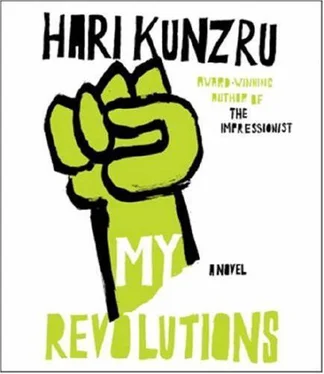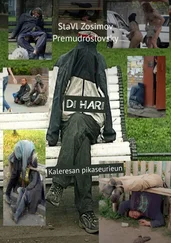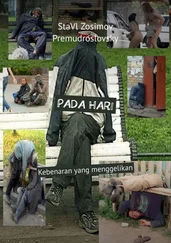After a while, the spotlights switch off, cutting out with a click and a soft buzzing exhalation, like a sigh. I’m left in darkness, breathing in, breathing out. Gradually I’m able to make out the horizon, the point where the purple-blue sky is cut off by the denser black of the hills.
I shut my eyes.
There was to be another action. That was what they told me, after my interrogation. A job we were to do for Khaled. They laid
out the details. Whether it was come-down or disorientation or simple shock, I was able to listen and show no emotion at what was being proposed; my horror existed in a small, locked-away place, far from the surface. Everyone was very friendly to me. Sean and Leo in particular went out of their way to be nice. As proof of my recuperation, I was given an important task. I would meet the PFLP contact in London and pick up our next tranche of funding.
I drove there overnight with Sean, half listening to his stream of fractured amphetamine jokes. He dropped me in the West End as dawn broke, where I hung around for a couple of hours, waiting for things to open and wishing I didn’t feel so sick. Then I went to meet the man we knew as Yusef. In a Lebanese café that smelled of rose-water and cigarettes we drank cups of bitter coffee and I watched him adjust his tie and run his fingers over the lapels of his fashionable suit, caressing himself, stealing glances at his reflection in the plate glass of the window. He handed me a package containing five thousand pounds. He didn’t seem to notice how my hands were shaking, the dusting of spilled sugar on the table.
I wasn’t sure before. It was only when I stepped out onto the pavement that I knew what I was going to do. My Michael Frame passport was in my pocket. I had a bag full of money. I hailed a cab and twenty minutes later was standing on Cheyne Walk, looking at the little village of houseboats moored in front of the elegant townhouses. Low tide had exposed an oily swathe of black Thames mud, a cluster of peeling hulls and a wooden gangway butting up against a flight of weed-slathered concrete steps. The Roaring Girl , the Linnet , the Annicka , the Lisboa Princess . Some were shabby, others spick and span. Here and there were jolly touches: stripy life preservers, rows of pot plants. One or two boats were flying the Union Jack. A Bohemian slovenliness hung over the place, a mannered slouch.
The Martha was an old tug with a freshly painted nameplate and a little porch built in front of the wheelhouse. I spotted a patched section on the side, which I supposed was the shell-hole. The deck was cluttered with folding chairs and a bicycle was chained to the
gangplank rail. I walked up and knocked on the cabin door. There was no reply. I knocked harder.
Miles had obviously been asleep. In his ratty check dressing gown and scuffed leather slippers, he looked very young, almost like a schoolboy. “Chris, what are you doing here?”
“I need to talk.”
He frowned. “You’d better come in.”
He made coffee in the galley and I sat on a stool, wondering how to start. Miles kept his place very tidy. There were no piles of books, no dirty laundry on the floor. Everything was perfectly presented, from the row of gleaming copper pans hanging over the stove to the Super 8 camera standing decoratively on a tripod by the bed.
“I need to tell you something, but before I do, you have to understand that I don’t want to know what you’ll do with the information. I don’t want to know anything, Miles, about what you do or who you are. Do you understand?”
“I think so.”
“After this, you won’t see me again. That’s part of the deal. I tell you and then I disappear.”
“All right. I’m listening.”
“I’m telling you because it’s gone too far. I can’t justify it, not what’s being proposed. Not politically — not morally , whatever that means. I want you to know that I’m not here because I’ve stopped believing in the need for a revolutionary politics. I haven’t. I’ll always work toward the revolution. I just need to stop this from happening.”
“I understand.”
And then I told him. The names of the members of our group. The addresses of our safe houses. I gave him what details I had of the next action. I told him where to find our cache of arms. At first he looked confused. It took him a while to realize what I was talking about. When he did, he looked ashen. After a while he began to take notes on a legal pad. When I’d finished, he breathed deeply and shook his head.
“And Anna Addison? You haven’t mentioned her.”
“She’s not involved.”
He looked as if he were about to contradict me, then stopped himself. Lighting a cigarette, he flicked through his notes. “Where will you go?” he asked.
“It doesn’t matter.” It didn’t. Not then. Not for a long time. Outside, the traffic was beginning to build up along the Embankment as commuters made their way to work.
Thirty years later, running down East Street, we were making a spectacle of ourselves. Two middle-aged men, pink-faced and out of breath. I slowed down and Miles slumped gratefully against a wall. Passersby turned round to watch him, this dandyish man sitting on the concrete. He looked as if he were about to pass out.
“Last chance, Chris,” he choked. “If you walk away from me again, I’ll make a phone call and the tabloids will be on your doorstep by the end of the day. How do you think it’ll go for you with them on your back?”
I shrugged.
“I’ll tell you how. The police will be forced to act. There’ll be an investigation. And — this is what you need to know — if there’s an investigation they’ll find something against you. Do you understand, Chris? If they search they will find. And it’ll be serious, we’ll make sure of that. You’re fifty years old. What age do you think you’ll be when you get out of prison?”
All the years. All the years, because of conversations with Miles Bridgeman. It crossed my mind that I could kill him. I could take him into the park, wring his scrawny neck like a chicken’s. And then what? Then I’d be running. Did I really have the energy to run?
“And if I cooperate, what happens to Miranda?”
He laughed, standing up and brushing the seat of his trousers. “She’ll probably get a book deal.”
I pictured Miranda getting over the shock and finding herself the center of attention. Miranda doing the rounds of the talk shows, lunching with journalists from women’s magazines. Miranda blossoming, finding someone with better hair and teeth to sit beside her on the interviewer’s sofa.
“You’ll need a lawyer.”
“Oh, of course, a lawyer.”
He was irritated by my sarcasm. “Let’s get out of the street, shall we? We could at least try to talk like grown-ups.”
We went into the nearest place, a chain pub with blond wood furniture and a loud jukebox. One window was boarded up, presumably a souvenir of the previous night’s chucking-out time. Miles bought beers and I asked him what I hadn’t wanted to ask all those years previously, on his houseboat.
“Who are you, Miles?”
He pursed his lips in annoyance. “Oh, God, Chris, don’t get metaphysical. I couldn’t bear it.”
When he spoke again, his voice was weary. “OK. You want my story? Once upon a time I wasn’t so far away from you, politically. Not as serious, no, but I did want things to change. Unfortunately I didn’t have a choice about how I acted. They had me. They had me from before I first met you.”
“What? Recruited over sherry in your tutor’s study? ‘Young fellow, how would you like to serve your country?’ ”
“Christ, you probably think that’s really how it happens. That’s the funny thing about you, Chris. After all this — all this madness you’ve been through — you’re still peculiarly naïve. Amazing, really. No, I got busted. It was in 1966. I knew a man who ran a gallery, a little place in St. James’s that sold objets d’art . Oriental stuff, mostly. Pictures and vases, chinoiserie. He offered me a job. I’d been at school with his brother.”
Читать дальше












